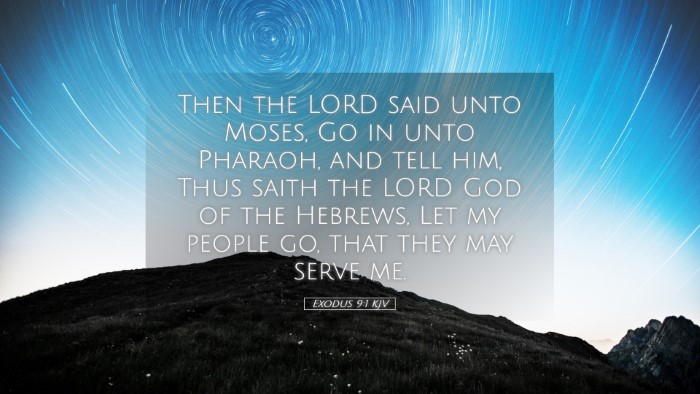Exodus 9:1 - Commentary Analysis
Verse Context: Exodus 9:1 reads, "Then the LORD said to Moses, 'Go in to Pharaoh and say to him, “Thus says the LORD, the God of the Hebrews: Let my people go, that they may serve me.”'
This verse marks a significant moment in the narrative of the Exodus, containing both an urgent command from God and the historical context of Israel's enslavement in Egypt. It sets the stage for the continuing confrontation between Moses and Pharaoh.
Theological Insights
Divine Authority: The phrase "Thus says the LORD" emphasizes the authority of God's word. Commentators like Matthew Henry note that Moses is not negotiating or requesting favor; rather, he is delivering a command from the Almighty.
Significance of Being Called: As Albert Barnes points out, God’s use of the phrase “God of the Hebrews” highlights the personal relationship God has with His people and His divine obligation to deliver them. This suggests both a plea and a promise—a call to freedom rooted in divine loyalty.
Understanding Pharaoh
Pharaoh's Resistance: The resistance of Pharaoh is crucial to understanding the narrative. Adam Clarke discusses Pharaoh's hardened heart as a divine act, suggesting that through this, God aims to display His power and ensure His name is proclaimed throughout the earth. A deeper look into Pharaoh's character reveals his pride and the central role it plays in the unfolding events.
Leadership Dynamics: In this text, God is not only addressing Pharaoh but also shaping Moses into a leader capable of confronting the might of Egypt. Henry comments that the repeated demands place both Moses and Pharaoh in positions of extreme tension where God's purpose shines through the human struggle.
Historical Context
This verse is part of a larger narrative where God is liberating the Israelites. Commentators make note of the historical background of oppression that exists in Egypt at this time. Barnes writes about the harsh realities faced by the Hebrews and how this divine command initiates a series of acts that show God's supremacy over the Egyptian deities and their ruler.
Understanding that Pharaoh is a representative of both political might and spiritual blindness is vital to the commitment of leadership and the proclamation of God’s will.
Literary Structure
The call to Moses includes both imperative verbs and prophetic wording, which serves to underline the desired outcome of the exhortation. The structure of this command is both succinct and powerful. Clarke mentions that the structure of divine messages often includes a clear program (let my people go) and a defined purpose (that they may serve me), which are recurrent themes throughout Exodus.
Application for Today
God’s Call to Serve: This passage prompts serious reflection on what it means for contemporary believers to respond to God’s call. Just as Moses and the Israelites are to serve God, modern believers are also called to fulfill God's purpose and serve with commitment.
Resistance to God’s Will: The character of Pharaoh reminds us of the human tendency to resist divine intervention. Matthew Henry warns that just as Pharaoh’s heart was hardened, individuals today can also be tempted to harden their hearts towards God’s calling.
Leadership Lessons: Moses' role as a mediator serves as a vital leadership lesson for pastors and lay leaders. His reliance on God's direct command demonstrates the importance of grounding leadership in divine instruction rather than personal ambition.
Conclusion
In conclusion, Exodus 9:1 is not merely a historical account but a rich well of theological reflection that offers profound insight into God's desire for freedom, service, and leadership. As leaders and scholars study this passage, they are called to understand the significance of their response to God’s commands not only in their own lives but in the lives of those they lead.
Every reading of this verse provides an opportunity for introspection and a chance to grow in faith, encouraging a deeper commitment to serve God as part of His redemptive plan.


